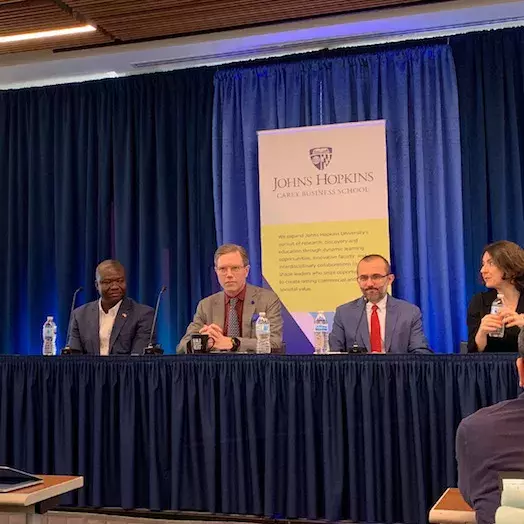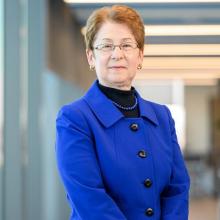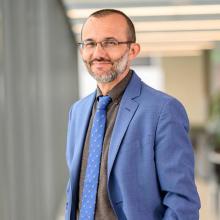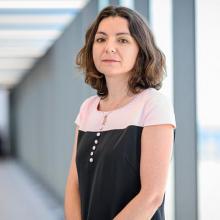
Researchers explore the economic impact of COVID-19
The world is grappling with the continued spread of the novel coronavirus COVID-19. The most recent measure of infections and deaths from COVID-19 is available through an online data tracker maintained and updated by the Johns Hopkins Center for Systems Science and Engineering.
As the disease causes widespread illness, it is also creating disruptions and uncertainty for the global economy.
To explore the potential economic consequences of the COVID-19 outbreak, Johns Hopkins Carey Business School convened a panel of faculty experts February 17. The panel included Mario Macis, an associate professor and economist at Carey Business School who studies global health. In 2016, he collaborated with the United Nations development program to estimate the social and economic impact of Zika virus on Latin American and Caribbean countries. Emilia Simeonova, also an associate professor and economist at Carey was on the panel as well. Simeonova specializes in the fields of health and health care, and the economics of children's health and collaborated with Macis on the United Nations Zika report.
Tolbert Nyenswah, a senior research associate at Johns Hopkins Bloomberg School of Public Health, completed the panel. Prior to joining John Hopkins, Nyenswah was deputy minister of health for Liberia and managed a multinational team responding to the world’s largest Ebola outbreak in 2014.
Valerie Suslow, vice dean for faculty and research, opened the discussion, and KD Frick, a health economist and the vice dean for education at Carey, moderated the panel. Frick began by asking the panelists to describe how diseases can affect an economy and how COVID-19 measures up to previous global outbreaks.
Johns Hopkins Carey Business School convened an expert panel of research on February 17, 2020, to explore the potential economic impact of the COVID-19 outbreak.
Impact on the economy
Based on the information available at the time of the panel discussion, Macis explained that COVID-19 was having an immediate impact through the loss of production and the disruption of supply chains in China, the epicenter of the disease outbreak. “Many manufacturers in the U.S., in Europe, in the rest of the world outside of China, rely on components from China, on capital goods from China,” he said. “And so disruptions in factories in China mean that U.S. companies don't have intermediate inputs that are necessary for them to produce final goods and sell their final goods.”
Simeonova noted that the outbreak was also stifling travel and tourism, while uncertainty about the disease could lead to fluctuations in global stock markets.
Comparisons to previous coronavirus outbreaks
The panelists noted that it is difficult to draw direct correlations between COVID-19 and previous epidemics like SARS (Severe Acute Respiratory Syndrome), MERS (Middle East Respiratory Syndrome), and Ebola, or even seasonal influenza, because they all behave differently depending on morbidity, mortality, or contagiousness.
“Chronic disease also has an immediate cost and [leads to] reduced productivity,” said Simeonova. “Also [there’s] the burden of access, mortality and so on. I think everything here is magnified simply because there is so much added uncertainty about who is going to get it, how it's going to travel.”
Nyenswah drew upon his experience battling Ebola, a virus that appears to be less contagious yet far more lethal than COVID-19. He noted that the Ebola outbreak of 2014 cost Guinea, Liberia, and Sierra Leone, about $2.2 billion of their gross domestic product in terms of direct costs, which did not include indirect costs from lives lost or reduced social interactions. “In my country, Liberia alone, we lost about 4,800 people from the disease and 11,000 others got infected. The GDP of Liberia was almost reaching to double digits. When Ebola struck, we saw below 0 percent GDP.”
According to Nyenswah, some global estimates of the economic burden of the Ebola outbreak are as high as $32.6 billion in lost GDP. The comprehensive economic and social burden from the 2014 outbreak was $53.19 billion. The most significant component, $18.8 billion, was from deaths from non-Ebola causes.
While it is difficult to draw comparisons between COVID-19 and SARS, another coronavirus that suddenly emerged from China in 2003, Macis noted that SARS did not produce long-lasting damage to the global economy. “When you look back at what happened in 2003 during SARS, you see GDP growth [in China] falling substantially by two percentage points in the second quarter of 2003 compared to the previous quarter,” Macis explained. “But then as soon as the outbreak was under control and started to slow down, we saw a recovery.” It is too early to predict the eventual outcome of COVID-19 as the outbreak remains very fluid.
Simeonova added that COVID-19 could have a similar economic trajectory as long as the “economic fundamentals” do not change. However, the uncertainty mounts the longer the outbreak continues and the farther the disease spreads. “The important thing to emphasize here is the difference in the transmission rate,” she said. “SARS and MERS seem to have much lower transmission rates than [COVID-19] at this point. And probably the closest thing that we can compare it to is the Spanish flu, which happened in the early 20th century. There were very few containment efforts then, if any, until it really got out of control.”
Prognosis for the future
While there is great uncertainty about how the COVID-19 outbreak will unfold, Nyenswah cautioned that the world will likely see more diseases like it in the future. “We're faced with a very, very peculiar situation and difficulties at this time in our global interaction, the interaction between animals, humans, and environment, especially animals and humans getting closer than ever before due to climate change, deforestation, and other issues that affect the environment,” he said. “Right now, we're seeing the frequent outbreaks of the diseases from animals. We should get prepared for more emerging diseases and re-emerging diseases that will affect the human population.”
Macis speculated that the current crisis could spur some businesses to rethink their operations. “The wisdom of single sourcing might be revised. So at some point it's the economics of it that, in part at least, causes this fragility in the system,” he said.
Simeonova explained there could be long-lasting consequences of COVID-19 even after the acute cases subside. She noted that children born of mothers infected with the Spanish flu were found to have higher rates of disability, mortality, and chronic disease up to age 50.
Simeonova also recounted a study of a London neighborhood hit particularly hard by a cholera outbreak in 1854. “One hundred sixty years after this happened, rents in that area were lower, tenancy was shorter, poorer people were living in that part of town. And they show that this started happening right after the epidemic and had effects for over a hundred years,” she explained. ”This neighborhood in London that experienced the cholera outbreak was populated by people who were poor, there was higher occupancy rates, higher turnover. It turned into a slum and it continued to be.”
Of COVID-19, she said, “I worry about the long-term consequences.”
About our experts
Professor and Vice Dean for Faculty and Research
Valerie Suslow is the vice dean for faculty and research as well as professor, and she joined Johns Hopkins University in August 2015. Previously, Suslow was a senior associate dean for MBA Programs at the Ross School of Business at the University of Michigan, where she was also a professor of business economics and public policy, and the Louis and Myrtle Moskowitz Research Professor of Business and Law.
Associate Professor
Mario Macis, PhD is an Associate Professor of Economics. He is also Affiliate Faculty at the JHU Berman Institute of Bioethics, Associate Faculty at the Armstrong Institute for Patient Safety and Quality at JHU Medicine, and Faculty Research Fellow at the National Bureau of Economic Research (NBER) and the Institute of Labor Economics (IZA, Bonn). Between 2016 and 2019, he served as Academic Program Director of Carey's MS in Health Care Management.
Associate Professor
Emilia Simeonova, PhD (Economics from Columbia University in 2008) joined Johns Hopkins Carey Business School in 2013 from Tufts University. Between 2011-2012 she was a research fellow at the Center for Health and Wellbeing at Princeton University. Emilia’s research interests in the economics of health care delivery, patient adherence to therapy and the interaction between physicians and patients, racial disparities in health outcomes, the long-term effects of shocks to children's health and the intergenerational transmission of health.





